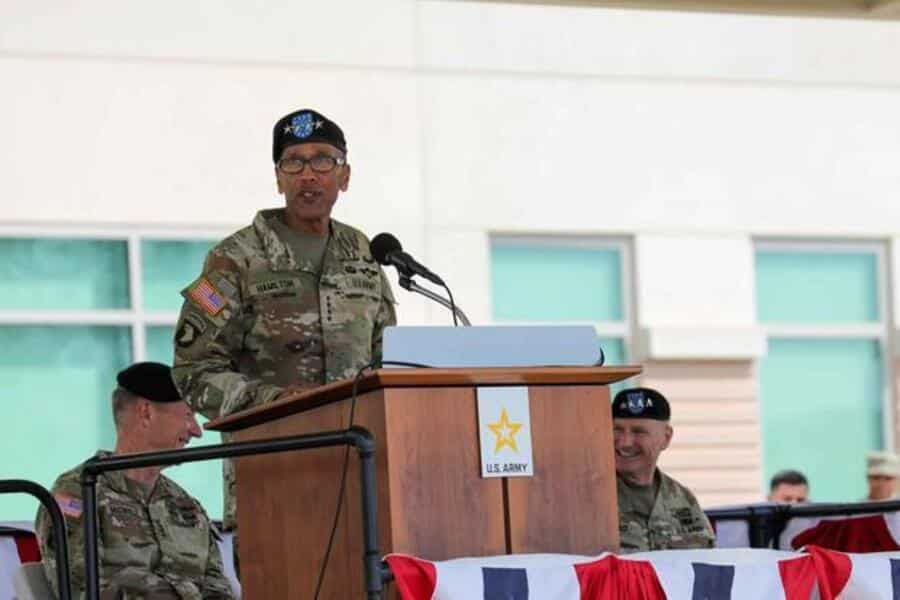
In an unprecedented move that has sent ripples through the highest echelons of the United States Army, General Charles Hamilton, a four-star general at the helm of the Army Materiel Command, has been temporarily relieved of his duties pending an investigation into allegations of misconduct. Accused of improperly influencing the Army’s command selection process, Hamilton’s case highlights the delicate balance of power and ethics within military leadership roles.
The allegations against him bring to the forefront the intricate dynamics of authority, mentorship, and the paramount importance of maintaining integrity within the military’s hierarchical structure. As the Army Secretary Christine Wormuth initiates a rigorous review and the Department of Defense’s inspector general takes charge of the investigation, the military community and the nation watch closely.
The outcome of this investigation could have far-reaching implications for leadership practices, ethical standards, and the very fabric of military command culture. In navigating this complex issue, the Army faces a critical test of its commitment to fairness, transparency, and principled leadership that is foundational to its esteemed tradition.
Background
General Charles Hamilton’s career in the United States Army is emblematic of the distinguished service and leadership expected at the highest echelons of military command. As a four-star general, Hamilton has wielded significant influence over strategic decisions, personnel management, and the logistical readiness of the Army, reflecting the critical role such senior leaders play in national defense and military operations.
His ascent to the rank of four-star general, a level achieved by only a select group within the Army, underscores his extensive experience, leadership qualities, and the trust placed in him by the military and the nation.
At the heart of the controversy surrounding General Hamilton is the Army’s Battalion Commander Assessment Program (BCAP), an innovative approach to selecting battalion commanders—key leadership positions responsible for hundreds of soldiers. BCAP was designed to ensure that selections are made based on merit, leadership skills, and ethical integrity, using a comprehensive evaluation process that includes psychological assessments, peer reviews, and rigorous interviews.
This program represents a crucial effort by the Army to enhance leadership quality, eliminate toxic leadership, and ensure that those chosen to lead embody the values and competencies essential for the well-being and effectiveness of the force. BCAP’s significance in shaping the future of Army leadership cannot be overstated, making the integrity of its process a matter of utmost importance.
Overview Of Allegations
Allegations against General Charles Hamilton have thrust the integrity of the Army’s Battalion Commander Assessment Program (BCAP) into the spotlight. Central to the controversy is Hamilton’s alleged intervention to influence the outcome of the command selection process for a lieutenant colonel, who previously served as his assistant and executive officer.
The general is accused of exerting his considerable influence to secure a second interview for the officer after an assessment board unanimously decided against recommending her for command.
This move, highly unusual within the rigorously impartial BCAP framework, raised concerns about the potential for undue influence at the highest levels of command.
Hamilton’s efforts reportedly extended to contacting several senior leaders, discussions interpreted as attempts to sway the panel’s decision-making in favor of the lieutenant colonel during her second assessment.
This breach of the BCAP’s designed impartiality prompted a swift response from the Army’s leadership. Recognizing the gravity of the allegations, Army Secretary Christine Wormuth temporarily suspended General Hamilton from his duties and referred the matter to the Defense Department’s Inspector General for a comprehensive investigation.
This decisive action underscores the Army’s commitment to preserving the fairness and integrity of its leadership selection processes.
The allegations against General Charles Hamilton strike at the core of the Army’s efforts to uphold integrity, meritocracy, and transparency within its ranks, particularly through the Battalion Commander Assessment Program (BCAP).
If these allegations are substantiated, they could significantly undermine the BCAP’s credibility, a cornerstone initiative designed to eliminate toxic leadership and ensure that command positions are filled based on merit and leadership qualities.
Such a breach could erode trust and morale among the ranks, affecting not only officers and enlisted personnel with aspirations for command but also the broader organizational culture that values fairness and equal opportunity.
Investigation
The investigation into General Hamilton’s actions, conducted by the Defense Department’s Inspector General, follows a stringent process aimed at uncovering the truth while ensuring due process. This involves gathering evidence, interviewing witnesses, and assessing the impact of the alleged actions on the BCAP’s integrity.
The outcome could range from exoneration to disciplinary measures, depending on the findings’ severity. Meanwhile, Lt. Gen. Chris Mohan’s assumption of Hamilton’s duties underscores the Army’s commitment to continuity of leadership and operational effectiveness, even as it navigates the complexities of maintaining the highest standards of conduct and ethical leadership.
This situation serves as a pivotal moment for the Army, highlighting the delicate balance between mentorship, advocacy, and the imperative to safeguard the sanctity of its leadership selection processes.
The controversy surrounding General Hamilton’s alleged interference in the Battalion Commander Assessment Program (BCAP) may serve as a catalyst for comprehensive reforms and heightened scrutiny of the Army’s leadership selection processes.
Experts in military ethics, alongside former and current Army officials, underscore the paramount importance of maintaining transparency and integrity within these programs. The incident has sparked a broader dialogue on how the Army can continue to evolve its leadership culture, ensuring that it not only selects for competence but also for ethical leadership and a commitment to the well-being of subordinates.
This investigation into General Hamilton’s actions, while focused on a specific case, reflects deeper questions about the nature of leadership and mentorship within the military. It underscores the necessity for a balance between advocating for one’s subordinates and maintaining the impartiality of the command selection process.
The outcome of this case and the subsequent reforms it may inspire are pivotal for reinforcing trust in the Army’s commitment to upholding the highest standards of leadership and integrity, essential pillars for the effectiveness and morale of the force.








